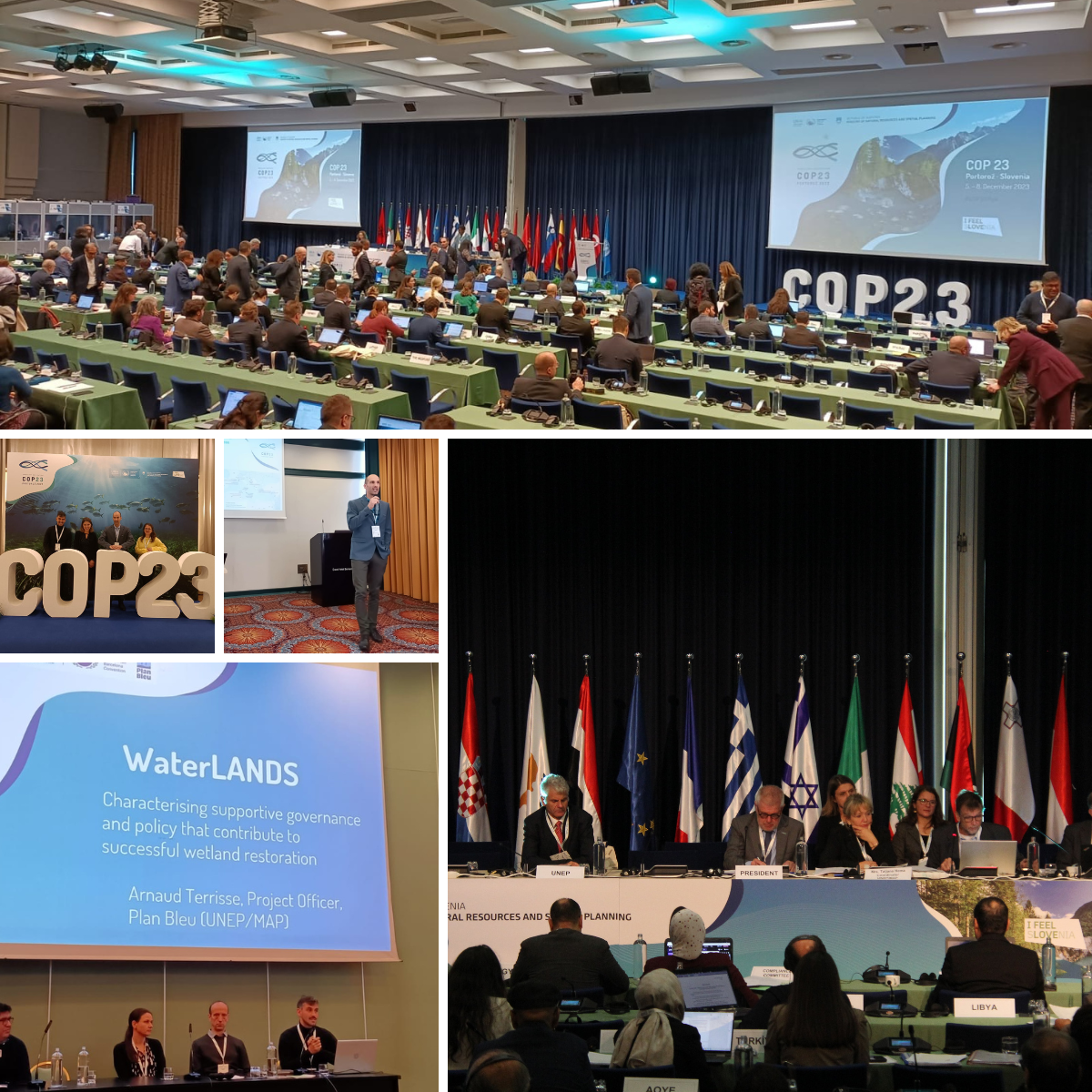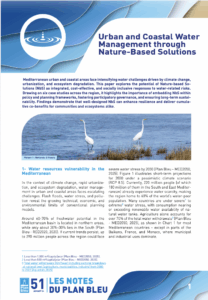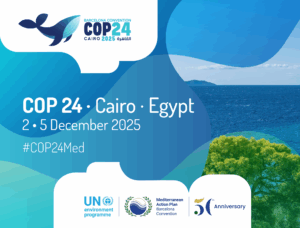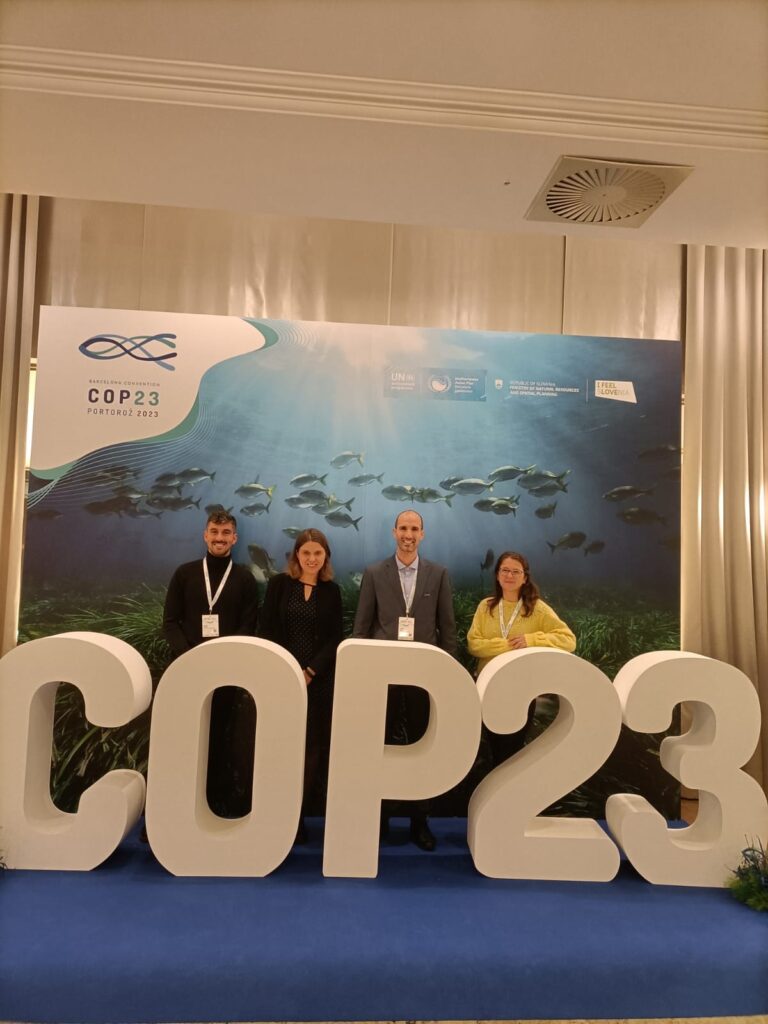The 23rd meeting of the Contracting Partiesof Barcelona Convention, theCOP23, was from December 5 to 8, 2023 at Portorož, in Slovenia, bringing together 21 Mediterranean countries and with the theme “Green transition in the Mediterranean: moving from decisions to actions”. Slovenia took over the presidency of the Barcelona Convention for the years 2024-2025, delegates welcomed Mr Mitja Bricelj, President of COP23, and approved the composition of the Bureau until 2025.
Fatma Varank, Deputy Minister of Environment, Urbanization and Climate Change of Turkey, and President of the COP Governance, opened the meeting by emphasizing the need for a holistic and united search for solutions to the challenges environmental. Subsequently, Tatjana Hema, coordinator of UNEP/MAP – Barcelona Convention, presented the Mediterranean successes and the MAP medium-term strategy (2022-2027). The environmental assessment compiled by UNEP/MAP and presented at COP23 highlighted the urgency of action: “We need accelerated implementation at the national level. Together we can transform decisions into effective actions that deliver good environmental status and fulfill the objectives for which UNEP/MAP was created 50 years ago, providing the Mediterranean with one of the strongest regional regulatory frameworks in the world. the field of environment, protection and sustainable development,” declared Tatjana Hema.
The Contracting Parties have made progress in articulating the Mediterranean region’s response to the triple global challenge: climate change crisis, loss of biodiversity and pollution:
Progress on climate change
Contracting parties approved the summary for decision-makers of the special report on coastal climate and environmental risks of the MedECC – the science-politics network whose Secretariat is hosted by Plan Bleu in Marseille. Additionally, the contracting parties decided to establish a regional activity center dedicated to climate change hosted by Turkey. COP23 also renewed the commitment of States to national and local measures for the implementation of maritime spatial planning and integrated coastal zone management (ICZM), in accordance with the Barcelona Convention and its Protocols. Ensuring that blue economy development does not come at the expense of nature, ICZM and MSP ensure that healthy marine and coastal ecosystems support green economic progress while providing protection for coastal communities facing increased risks and disasters induced by climate change.
Fight against the loss of nature and biodiversity
In the Portoroz’s Ministerial Declaration, the contracting parties undertake to do everything possible to ensure that by 2030, at least 30% of coastal and marine areas are effectively conserved and managed. They also renewed their commitment to halting the degradation of marine and coastal biodiversity through the effective implementation of the Post-2020 Biodiversity Framework for the Mediterranean region (aligned with the Kunming-Montreal Global Framework). COP23 also adopted decisions on the conservation of endangered and threatened marine species under the Protocol on Specially Protected Areas and Biodiversity (SPA/BD), extending protection to six additional species of sharks and rays , providing management measures for three species of rays and restoring the great mother-of-pearl Pinna nobilis. As part of the fight against the introduction of non-native species from ships’ ballast water, the Contracting Parties have adopted the “Regional Harmonized Procedures for the Uniform Implementation of the Ballast Water Management System at Sea Mediterranean” prepared by REMPEC in cooperation with RAC/SPA.
Reduce pollution and waste
New legally binding and time-bound regional plans on agriculture, aquaculture and urban stormwater management and related regulatory measures were adopted in Portorož, within the framework of article 15 of Land Source Protocol (LBS) of Barcelona convention. Regarding plastic pollution, contracting parties agreed on the need for a comprehensive approach that takes into account the entire life cycle of plastic. This approach is taking place in the context of ongoing global negotiations around a legally binding instrument on plastic pollution, including in the marine environment. There was also a commitment to the implementation of the global chemicals framework adopted at the 5th International Conference on Chemicals Management (ICCM5, 25-29 September 2023), recognizing linkages and synergies potential with their obligations under the LBS Protocol of the Barcelona Convention. For air pollution caused by ships, the contracting parties have committed to apply the sulfur oxide emissions control zone. Contracting Parties further urged States not yet party to MARPOL Annex VI to ratify the Convention as soon as possible so that the measure enters into force on 1 May 2025.
Plan Bleu‘s teamactively participated in this event and several side events during the week:
- On December 5, Arnaud Terrisse, Project Manager at Plan Bleu, shared Plan Bleu’s experience on the use of legal indicators, analyzed through the prism of the framework established by the system of the Barcelona Convention and its Protocols during a COP23 side event entitled: “Legal indicators to better apply the Barcelona Convention and its Protocols”.
- On December 6, Arnaud Terrisse also presented the work of Plan Bleu linked to the potential for ecosystem restoration in the Mediterranean. More specifically, the work of Plan Bleu in the project WaterLANDS was discussed in the side event entitled “Enhancing Mediterranean resilience to climate change”. Work group Interreg Euro-MED Dialogue4Nature also announced that they were now open to policy makers.
- On December 6, Antoine Lafitte, head of the observatory at Plan Bleu, spoke in the side event “Tools and initiatives to promote a sustainable blue economy in the Mediterranean”. He presented different practices and tools to promote the sustainable blue economy, with a focus on coastal and marine tourism, marine spatial planning, governance of the blue economy, and actions to raise awareness of the ecological transition.
- On December 8, the Plan Bleu team took part in a side event entitled “The perception of youth” during the last day of COP23, highlighting the subject of youth and education. During this event, Plan Bleu examined the vision of young people regarding the project MED 20250, which aims to confront various visions of the future of the Mediterranean by 2050. The objective is to collaborate in creating solid and realistic transition paths towards common sustainable development goals.
A COP 23 which kept its promises and which further strengthened collaboration between Mediterranean countries and key players committed to the sustainable development of the region. In addition to national delegates, the meeting was an opportunity for many regional environmental protection institutions to make themselves heard, as were young people, represented in large numbers at this COP23 and carrying a strong message to encourage Member States to act.














